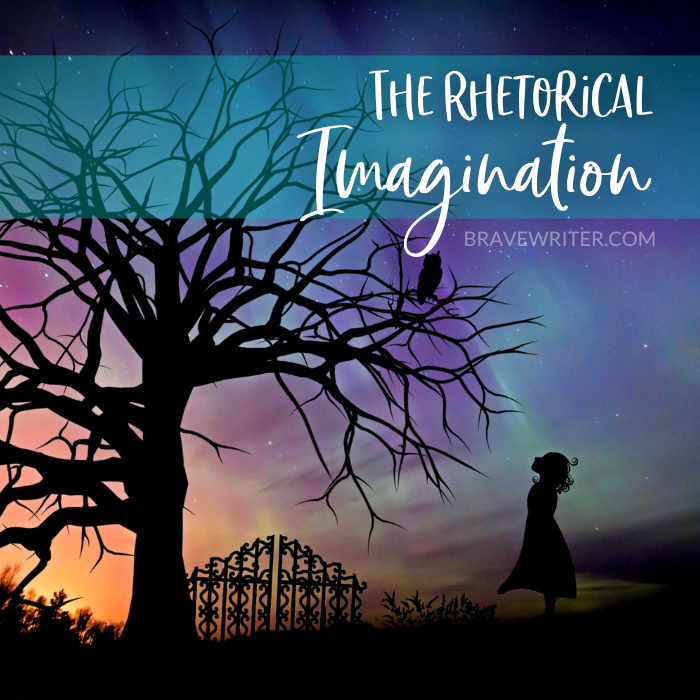The Rhetorical Imagination

I was in 6th grade, living in southern California. One November evening, I crossed the street to my daily playmate’s home for dinner. Melinda’s mother served hamburgers. I asked for a glass of milk. Mr. Thaler said I could not have one. I asked why. He replied that their family “kept kosher” and could not mix meat and dairy products during a meal.
I did not relent. His comment made no sense to me. After all, I didn’t keep kosher. My family expected us to drink milk every night for healthy teeth. “But I’m not Jewish. I can have milk with my hamburger.”
Mrs. Thaler joined in, “Dairy and meat can’t even be on the same table, Julie. It’s not about what you can eat or not eat. It’s about our home. Our home is a kosher home and so milk and meat cannot be at the same meal.”
I sat stunned—momentarily ejected from the room. My mind raced.
Wait—that means the Thalers never have cheeseburgers. Will Melinda be able to eat at my house? What is “kosher” and why is it so important to them? This is unfair! This rule makes no sense! I want milk!
I was used to having what I wanted when I wanted it. This whole idea that I had to adjust my meal habits to theirs for a reason I didn’t even hold felt wrong and annoying. I stuck with the one value from home that did apply: politeness. I finished my meal and thanked them.
But what else happened that day? My world tilted. An invitation to expand had been extended to me.
At age 11, the world I knew was defined by my parents, care givers, teachers, and religious leaders.
All children learn without instruction what constitutes “normal” for them—what can be taken for granted, what we deserve, how we’ve been wronged, who is out to get us, and who is on our side.
As we grow up—our circle widens and we encounter for the first time: “the other.” We determine whether or not we will include or vilify this alternative way of living and seeing the world.
The experience of expansion has a name and it is valuable to becoming an educated person. I call it “The rhetorical imagination.”
The rhetorical imagination is the experience of
encountering, examining, and holding multiple viewpoints
simultaneously, dispassionately.
The rhetorical imagination is a tool we use to grow academically. We open ourselves to the perspective presenting itself and begin with the assumption that there is an internal coherence and logic to a viewpoint, even if that coherence and logic make us uncomfortable. Even if inconvenient.
This capacity requires us to suspend our own judgments and to momentarily shift into the seat of the other to see the world through different eyes. Those eyes may be more or less religious, more or less tolerant, more or less educated, more or less political, more or less financially secure, more or less experienced, more or less skilled…
Even “objectively” wrong views (the belief that the world is flat, for instance) believed by individuals are rooted in some kind of interior logic (after all, in our own heads, what we think is true makes sense to us or we couldn’t think the thoughts!). The task of an academic is to wade into those views (our own and those of others), to suspend judgment in order to identify how that person has arrived at that conclusion and what that conclusion offers the one who holds the viewpoint.
Famously, centuries of misinformation have been sustained by a lack of tools to measure what we did not know, or by political and/or religious empires that stood to gain from an uneducated constituency. It was stunning, for instance, to visit Prague last spring to see the Astronomical Clock which measured the time by putting the earth in the center of the clock face. Each day, citizens would walk by this clock to tell time. How could a person in the 1400s have any hope of understanding the true nature of the universe with that out-sized misinformation mounted and gilded (measuring the minutes and hours every day with planet earth dead center in the solar system) towering over them? Of course the earth was the center of the universe! There it was, on display, all day every day!
What a blow it would be to imagine that the earth was not in the center! For that new interpretation to gain footing, the challengers of the status quo had to be willing to unseat the power of centuries old beliefs.
The capacity to inquire, to be curious, to willingly suspend one’s own point of view in favor of opening to someone else’s is at the heart of the academic enterprise. It’s the discipline of higher education in particular! The research conducted in any field must begin with inquiry and suspending one’s own preconceived ideas in order to be open to new and different conclusions and solutions.
The development of a rhetorical imagination is critical to good academic writing: the essay, research paper, and beyond. So often parents and teacher obsess about formatting and citations. They are worried the student won’t know how to look up books with a card catalog and the Dewey decimal system, or how to write a “Works Cited.”
Those are easily taught. What is far more difficult is deliberately opening to a wide variety of viewpoints. It takes courage and curiosity. It requires a willingness to overturn assumptions, to be changed by what is read.
In fact, I’d say that the heart of the academic enterprise is the drive to be startled into insight!
The rhetorical imagination—the capacity to consider a wide variety of perspectives and possibilities—is the vehicle to take us there.


















